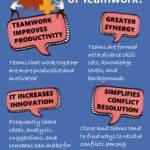
What are the 8 characteristics of effective teamwork?
Problem solving, decision making, communication and interpersonal skills are part of the 8 characteristics of effective teamwork.
Making a great team requires a completely new set of soft skills that don’t come easily. Members have to voice their opinions, deal with aggressive personalities, and work through differences.
Above all, members must take personal responsibility for delivering results. So how do you know if your team is working together at a championship level?
Smart leaders know that for their teams to work well, they must accurately identify employees’ skill sets and assign them tasks that are well suited to their abilities. When putting together teams, they choose people they sense will work together well.
The combined efforts of their team members produce superior results and build a sense of solidarity within their organizations.
These eight characteristics are a good indication of effective teamwork
- People who are on a team know they are dependent on each other. They understand that personal and team goals are important. By realizing this, time and effort aren’t wasted squabbling and achieving personal gain at the expense of others.
- When individuals work as part of a team, they work in an atmosphere of trust and are encouraged to express themselves openly. This type of environment encourages team members to ask questions and be more creative in solving problems.
- Team members feel ownership for their jobs and team because they have made a personal investment into the team. They focus on being successful for the team’s sake more than being part of a group. Group members often approach tasks like they’re hired help.
- Teams encourage individual members to apply their individual talent and knowledge to team objectives; thus, members contribute to the organization’s success
- All team members practice open communication with each other. They ensure they understand each other. This helps to foster a climate of trust among the team members.
- Great teams encourage members to learn on the job and develop new skills. Teams support members that want to learn and become more efficient. This directly affects overall performance and is the difference between success and failure.
- Decision-making involves the entire team. However, they understand that the team leader will decide if they cannot find a solution.
- Good teams resolve conflicts quickly and constructively. Team members are comfortable being open with each other and communicate freely.
(Reference: https://skillpath.com/blog)


